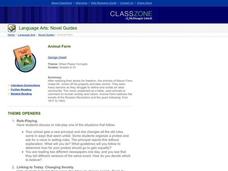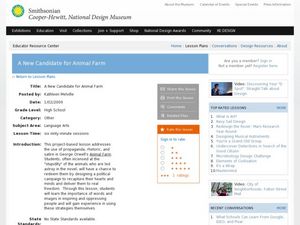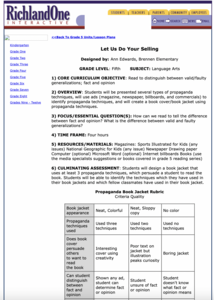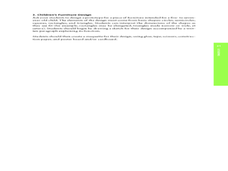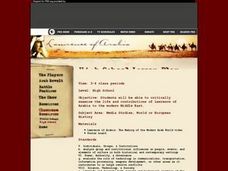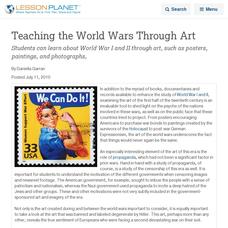Curated OER
Animal Farm
Students read Animal Farm and examine how power corrupts. They role-play situations involving power and control. They investigate corruption and abuse of power in society. They write propaganda articles and hold panel discusssionsabout...
Curated OER
A New Candidate for Animal Farm
Students create an advertising campaign in which a candidate from Animal Farm will run for an upcoming election. In this follow-up activity to George Orwell's Animal Farm instructional activity, students explore propaganda, rhetoric, and...
Curated OER
The Power of Images
Students explore emotions represented in artwork. In this cross curriculum social studies and art lesson, students explain examples of political and social issues expressed in artwork by Dorthea Lang, Diego Rivera, Dan Eldon, as...
Media Smarts
Looking at Food Advertising
Tony The Tiger, The HoneyComb Kid, The Nestle Quick Bunny. As part of a study of the methods advertisers use to sell foods and how this advertising effects their food choices, kids create their own spokescharacter and/or jingle for...
College Board
Evaluating Sources: How Credible Are They?
How can learners evaluate research sources for authority, accuracy, and credibility? By completing readings, discussions, and graphic organizers, scholars learn how to properly evaluate sources to find credible information. Additionally,...
Curated OER
High Exposure
Students interpret data they receive from the media, discuss possible misinterpretation of data from the media and correctly respond to the misconception quiz question.
Curated OER
Campaign Songs as Propaganda
Student analyze campaign messages about tariffs in a nineteenth-century campaign song. They identify the intended audience of the message. They discuss strategies for courting the other political party's bloc.
Curated OER
Let Us Do Your Selling
Sixth graders analyze several types of propaganda techniques and create a book cover using the techniques. In this propaganda techniques lesson, 6th graders analyze the propaganda techniques used in various ads. Students analyze the...
Curated OER
New Deal Agencies
Students identify examples of government intervention during crisis. In this New Deal lesson, students play a game to place descriptions and names to abbreviations of New Deal Agencies. Students interview a person who lived through the...
Curated OER
Ideal Objects
Students make connections between two design objects intended for different purposes and analyze the social and political meaning in the designs. In this design analysis instructional activity, students complete image based discuss...
Curated OER
Anti-Semitism Throughout the Ages
Students investigate the implication of anti-Semitism. In this prejudice lesson, students compare anti-Semitism to bullying as they research the propaganda techniques employed during the Holocaust and throughout history.
Curated OER
Understanding Life System: Growth and Changes in Plants
Third graders research ways in which plants are essential to humans. In this Global Peace lesson, 3rd graders participate in tasks, such as creating a propaganda poster. Students may watch the film, The Lorax, as a closing activity.
Curated OER
The Red Badge of Courage: A New Kind of Courage
High schoolers provide examples of Crane's treatment of the "manly virtues" associated with war using support from the text of The Red Badge of Courage. They describe the three published endings of The Red Badge of Courage and the...
Curated OER
Laurence of Arabia
Students critically examine the life and contributions of Lawrence of Arabia to the modern Middle East. They view a video on Laurence of Arabia. Students discuss the movie. Students create a propaganda posters or stories identifying...
Curated OER
Opinion/Facts: letters to the editor and endorsement
In this opinion and facts worksheet, pupils write the opinion and facts of letters to the editor that are for and against a candidate running for office. Students also write the propaganda technique used and example of an endorsement for...
Curated OER
Causes of the Civil War: Missouri Compromise, Compromise of 1850 and Kansas Nebraska Act
How did the Missouri Compromise, the Compromise of 1850, and the Kansas-Nebraska Act contribute to the growing tensions that led to the Civil war? To better understand the events that led to the Civil War, young historians engage in a...
Curated OER
Degenerate Art
Students examine the characteristics of expressionist and comtemporary art. They view a video clip and use the internet to see examples of each. They analyze the role of propoganda and symbols in art as well.
Curated OER
Examine Persuasive Elements by Reading, Analyzing, and Discussing Persuasive Text
Students identify persuasive strategies and analyze arguments. In this persuasive writing lesson, students read "Chief Red Jacket's Reply" and "Reverend Cram's Speech to the Iroquois Nation" and chart major elements of each argument....
Curated OER
Art Imitates Life
Elementary and middle schoolers examine postcards depicting World War I events. Eventually, they create prints that reflect their own lives. In an interesting blend of history and current events, this lesson should engage your kids in...
Curated OER
The Presidential Campaign Game
Learners play a game. For this election lesson, students play the Presidential Campaign Game. Learners learn about the politics and process of electing a president.
Curated OER
Argumentative/Persuasive Writing
Intended for an intermediate/advance ELD course, this resource can support anyone learning the techniques and discernment needed for effective persuasive/argumentative writing. Beginning with the issue of curfews for a quick class...
Curated OER
How Do Conflicts Escalate?
Students examine, evaluate and understand the concept of conflict, conflict escalation and colflict resolution through a variety of creative interactions.
Curated OER
Teaching the World Wars Through Art
Students can learn about World War I and II through art, such as posters, paintings, and photographs,
Curated OER
Chemical Reactions with Vinegar
Fifth graders create their own volcano. In this science lesson, 5th graders build a "volcano" using vinegar and baking soda. They observe and analyze outcomes, and define a chemical reaction.
Other popular searches
- Examples of Propaganda
- 5 Examples of Propaganda
- 8 Examples of Propaganda
- 3 Examples of Propaganda
- Sort Examples of Propaganda


